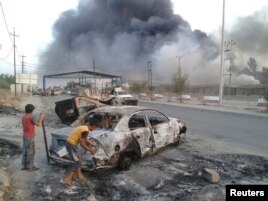17 June, 2014
Iraq belongs to the Organization of the Petroleum Exporting Countries, better known as OPEC. In fact, Iraq is OPEC's second biggest oil producer. It produces more than 3 million barrels of oil every day.
That is why a militant offensive in oil-producing areas of northern Iraq shocked energy markets last week. But the threat may not be as serious as some observers think. A lot depends on how long the unrest lasts.
Andrew Ricci works for Levick Energy, a research business. He thinks Americans will see only a small increase in gasoline and heating oil prices.

Civilian stand next to a burnt vehicle during clashes between Iraqi security forces and Islamic State in Iraq and the Levant (ISIL) in the northern Iraq city of Mosul, June 10, 2014.
Oil prices have changed little over the past four years. One reason is lower demand for oil in developed countries. Another is the rise in alternative fuel sources, including biofuel and ethanol from plants. There is also the possibility of currently undeveloped oilfields from Libya to Iran. John Kemp writes on energy issues for the Reuters news service.
"First of all, we saw South Sudan, then Libya, then Nigeria. Iran's oil has been kept largely off the market by sanctions, and now, we're seeing mounting problems in Iraq, all of which means that you can see lots of oil in the future. But in the near term, the market remains fairly balanced."
But Andrew Ricci says much will depend on whether Islamic militants are able to permanently occupy Iraqi territory.
"If the whole country goes back into insurgent hands, then I think, it's not going to be a good thing. All bets are off. Any instability is not going to be a good thing for hydrocarbon fuels."
The threat of unrest has helped push prices for future oil purchases to highs not seen since last September. But the threat of a cut in Iraqi oil exports may be limited. Energy experts say the country's most productive oil fields are to the south, in areas opposed to the Sunni-led militants.
I'm Mario Ritter.